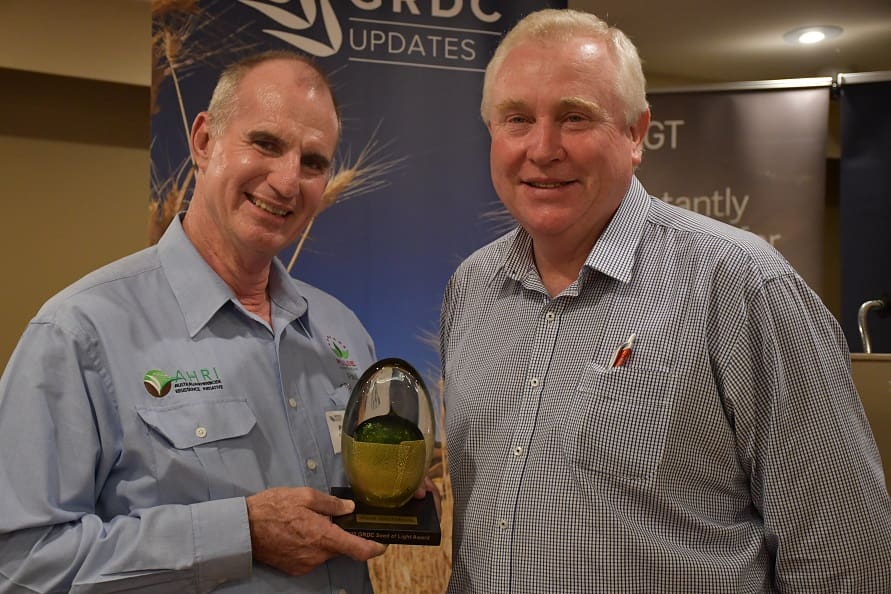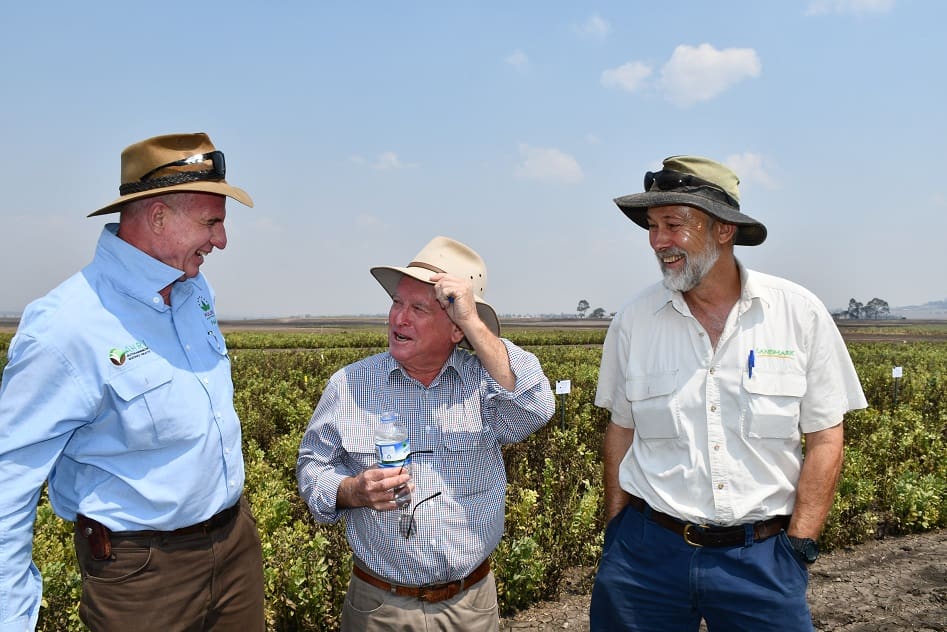
GRDC northern region 2020 Seed of Light Award recipient, Paul McIntosh, is congratulated by GRDC northern region panel chair, John Minogue.
ONE of the northern farming zone’s most respected agronomists, Paul McIntosh, has been recognised for his tireless dedication to the grain industry by being awarded the Grains Research and Development Corporation (GRDC) northern region 2020 Seed of Light Award.
Presented at the GRDC Grains Research Update in Goondiwindi last night, the award is bestowed annually on an individual who has made a significant contribution to communicating the importance and relevance of research outcomes to the wider grain industry.
Mr McIntosh, or Macca as he’s better known to many, has been a luminary in broadening the understanding, adoption and community recognition of best practice farming throughout his 40-year career.
Always quick with a humorous quip or anecdote, he is widely respected for his seemingly-boundless agronomic knowledge.
Grass-roots communicator
GRDC northern region panel chair John Minogue said Mr McIntosh was an outstanding leader with an innate ability to distil complex scientific concepts into information that has practical relevance to the industry and broader community.
“When Paul has something to say, everybody listens. He is exceptionally skilled in ensuring his conversations are targeted and relevant to the audience, whether that’s growers, agronomists, journalists or the general public, and this in turn fosters interest, understanding and adoption,” Mr Minogue said.
“This is critical to keeping the grains industry at the forefront of best management practice, improving the long-term productivity and profitability of farm businesses and ensuring we have the backing of the wider community.
“He’s well-known and liked both within and outside the industry and has always been extremely generous with his time and expertise regardless of whether you are a large or small grower, eminent researcher, senior agronomist, a trainee agronomist or a journalist. He firmly believes that everyone’s interest deserves to be given due attention.
“The northern grains sector is incredibly fortunate to have experienced professionals like Paul involved in research, extension and communication activities and the awarding of this year’s Seed of Light recognises the enormous contribution he’s made over the years to the performance and promotion of our industry.”
Remarkable career
Born and raised on a mixed farm at Goomeri in Queensland’s South Burnett, Mr McIntosh began his career in the town in 1973 as a trainee livestock auctioneer with the then-Australian Estates company which later became part of Elders Ltd. His first pay cheque was $92 for half a month.
He moved to Australian Estates branches in Charters Towers, Townsville, Julia Creek, Theodore, Rockhampton and Glen Innes during the mid-1970s beef slump before leaving the company in 1977 to take on a two-year stint working on the home farm at Goomeri.
During that time he travelled each weekend to Brisbane to play A-grade cricket with Sandgate Redcliffe at the start of the World Series cricket furore.
A big turning point came in 1979 when Mr McIntosh rejoined Australian Estates, accepting a position as merchandise and seed and chemical manager at Murgon and later taking on the same role with the company at Miles. Agronomy became a prominent part of his role and his interest in it grew from there.
“I gave up on the idea of going to England to play cricket and Dad and Mum sold the family farms all at the same time,” he said.
In 1983 he transferred to Wandoan under the company’s merger with Elders, and moved with Elders to Dalby in mid-1986.
Mr McIntosh left Elders in mid-1991 to take up a job with a friend in a private stock and station agency in Springsure till mid-1993 when he became regional agronomist for Primac, based in Toowoomba.
In May 1997, the business started Queensland Farmers Warehouse (QFW), initially in Toowoomba, then at Cecil Plains and Stanthorpe.
In March 2008, after a hip operation that didn’t go well, he reluctantly sold his shares in QFW and had a 12-month recovery at Gladstone before returning to the agency business as branch manager at Landmark Emerald.
He later transferred to Pittsworth to provide agronomic advice to the branch’s clients, as well as providing agronomy assistance to the Meandarra and Chinchilla branches.
He currently holds two industry roles – northern region agronomist for Pulse Australia and northern extension agronomist for the Australian Herbicide Resistance Initiative (AHRI) – as well as being a life member of the Australian Mungbean Association, Crop Consultants Australia member, former Pulse Queensland chair, chair of the former GRDC regional advisory committee, recipient of the 2018 AgForce Grains Service to Industry award and a regular Rural Weekly newspaper columnist.
Friends, opportunities and experiences
Mr McIntosh said he was incredibly honoured to receive the Seed of Light Award and proud to serve an industry that had given him so many friends, opportunities and experiences over the years.
“I’m one of those lucky people who love what they do. It’s given me the opportunity to meet and work with great folk over the years and indulge in hundreds of morning teas and lunches around kitchen tables – all home cooked and thankfully without coconut, gherkin, olive, capsicum and sardines in sight,” Mr McIntosh said.
“The people are by far the most rewarding part of my job, not just the growers but also the agronomists, researchers, past and present industry people and my media friends.
“When I was diagnosed with melanoma in 2017, it was the regular contact from work colleagues and friends in the ag industry that helped me restore a sense of `life goes on’ normality – it was a remarkable response and pulled me through a very tough time.”

GRDC northern region 2020 Seed of Light award winner, popular agronomist Paul McIntosh, with colleagues John Kerlin and Hugh Reardon-Smith.
Defining changes
Mr McIntosh has seen enormous change during his years in the farming sector, largely underpinned by technological advances, machinery improvements and product development.
“Some of the more defining advances include the release of synthetic pyrethroids like Sumicidin in broadacre cropping which was a godsend in the 1980 summer for heliothis and sorghum midge, and the wider use of Roundup which led to the development of zero till techniques and changed farming practice as we knew it,” he said.
“I often say that technology has given us our paddocks back and those advancements are continuing – technology and innovation are things our industry has always embraced to overcome challenges and take advantage of opportunities. It’ll be exciting to see what the next 40 years bring.”
Grain Central: Get our free daily cropping news straight to your inbox – Click here



HAVE YOUR SAY